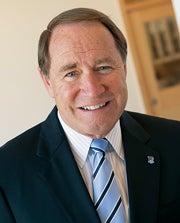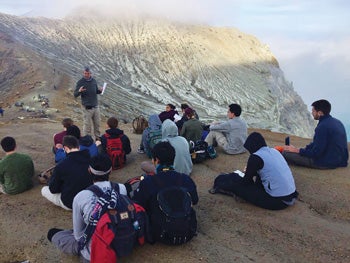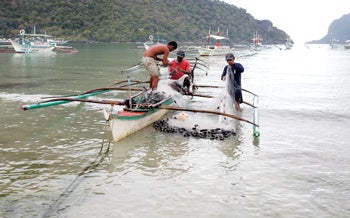President’s View

The milestones we marked from 2014–2018 are part of a continuum of growth and achievement that defines the institution we have become.
By the time you receive this issue, we will have concluded our celebrations as the class of 2018 moved into the next stage in its journey: life after URI.
As I presided over my ninth commencement as president of this dynamic institution, I felt great pride in the accomplishments of our students, faculty, and staff. Along with them, I was inspired by the words of former Environmental Protection Agency Head Gina McCarthy, a public health and environmental advocate, in her commencement address. I was delighted that our roster of honorary degree candidates also included Jim Taricani, an icon of journalistic integrity. Both McCarthy and Taricani remind us that our University is a place where principled voices will always be heard.
When this class entered the University in the fall of 2014, we were just about to embark on a successful $125 million bond campaign for our new College of Engineering facility, for which we broke ground in the spring of their junior year. Members of the class of 2018 were there at the September 2016 opening of the state-of-the-art Richard E. Beaupre Center for Chemical and Forensic Sciences. And their experience at URI notably included our yearlong celebration of the University’s 125th anniversary in 2017.
The milestones we marked from 2014-2018 are part of a continuum of growth and achievement that defines the University of Rhode Island in the 21st century.

College of the Environment and Life Sciences professor Tom Boving leading a mountainside class during J-term in Indonesia.
Our approach to transformation has been deliberate and intentional. We used the goals we established in 2010 as a launching pad for our academic strategic plan. We made difficult choices about where to invest—and where not to invest—as part of this strategy. We chose to invest in faculty and student diversity, and in programs that promote student success, like Take 15 to Finish and Finish What You Started. As a result, URI has made incredible progress in attracting, retaining, and graduating top students, and our enrollment numbers are more competitive every year.
We also invested in facilities and capital improvements. And we re-invested in some of our strongest flagship programs, like the Coastal Resources Center (CRC), which recently received the largest grant in URI history: $25 million to lead a five-year sustainable fisheries project, USAID/Philippines Fish Right Program. CRC will bring its expertise to address the serious challenges faced by the Philippine fishing industry. The grant further burnishes CRC’s and URI’s international reputations as being uniquely qualified to create local partnerships that build sustainable fisheries, protect marine ecosystems, and empower coastal communities. Two million Filipinos will benefit. And the grant will ensure that women and other marginalized groups will participate as equals in conserving and managing coastal and fisheries resources.

Local fishermen hauling in fish from nets, El Nido, Palawan Island, Philippines.
The grant underscores our growing international presence, which is further highlighted in this issue of QuadAngles, as we delve into URI’s Indonesia connection. Indonesia is a place where we are already making a difference, with planned dual-degree programs, faculty-led classes abroad, and Indonesian government officials enrolling at the University. Our numerous research projects support sustainable fisheries, coastal management, higher-education capacity building, and economic development. More research partnerships are planned in education, pharmacy, and nursing, as well as engineering. I have been to Indonesia three times in the last two years. J-term classes have visited as well, and this summer a group of alumni will travel there. I hope you will take the time to read here about how our relationship with this country of diverse cultures and perspectives is strengthening the global competencies of our students, faculty, and alumni.
As we gear up for a busy summer, I am already looking forward to greeting the class of 2022. Those students will benefit substantially from all the transformational progress we have made, and will help push URI to new levels of achievement and prominence. With each successive class, we grow and change. But we are always your University.
David M. Dooley
President, University of Rhode Island
 Home
Home Browse
Browse Close
Close Events
Events Maps
Maps Email
Email Brightspace
Brightspace eCampus
eCampus


